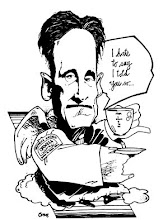
This is a section from the Policy Exchange, which has close ties with the Tories, and could be a detailed version of the upcoming election manifesto with regards Public Service Broadcasting and more specifically the BBC.
Connection from 'Septicisle'
Not that Policy Exchange itself is completely free from Murdoch devotees or those who call him their boss. The trustees of the think-tank include Camilla Cavendish and Alice Thomson, both Times hacks, while Charles Moore, former editor of the Daily Telegraph and who refused to pay the licence fee until Jonathan Ross left the corporation is the chairman of the board. Also a trustee is Rachel Whetstone, whose partner is Steve Hilton, Cameron's director of strategy. Whetstone was also a godparent to the late Ivan Cameron. The report itself is by Mark Oliver, who was director of strategy at the Beeb between 1989 and 1995, during John Birt's much-loved tenure as director-general. Oliver it seems isn't a blue-sky thinker to rival Birt however; his plans are much simpler.
His chief recommendation (PDF) is that the BBC should focus on quality first and reach second. On paper this is a reasonable proposal: the BBC has for too long tried to be all things to all people, although its reason for doing so is that all of the people are of course forced to pay a regressive tax to fund it. Oliver's pointed recommendations on what it shouldn't be doing though give the game away: it shouldn't be spending money on sports rights when the commercial channels do the job just as well when they win the bids. Has Oliver seen ITV's football coverage, one wonders? About the only sport ITV has covered well in recent years was F1, and they decided to not bid for the rights the last time they came up because of the money they'd spent on the FA Cup. The other thing the BBC should stop trying to do is 16-35 coverage, which really drives the point home. The real proposal here is that by stopping catering for the youth audience, the hope is that the young lose the reverence for the BBC which the older demographic continues to have, even if if that has been diluted in recent years. There is a case, as I've argued in the past, for shutting down BBC3 and privatising Radio 1, not to stop catering for the young but because the money spent on both could be better distributed and spent elsewhere. BBC3 in nearly 7 years of broadcasting has produced at most 5 programmes of actual worth, and all of them could have been easily made for and accommodated on BBC2. Radio 1 is just shit, end of story.
All of the points I would like to make myself, made the Septicisle. However, the BBC tickles my media desires simply because it does not have adverts. The licence fee is worth every penny for this reason, and this reason only.








No comments:
Post a Comment